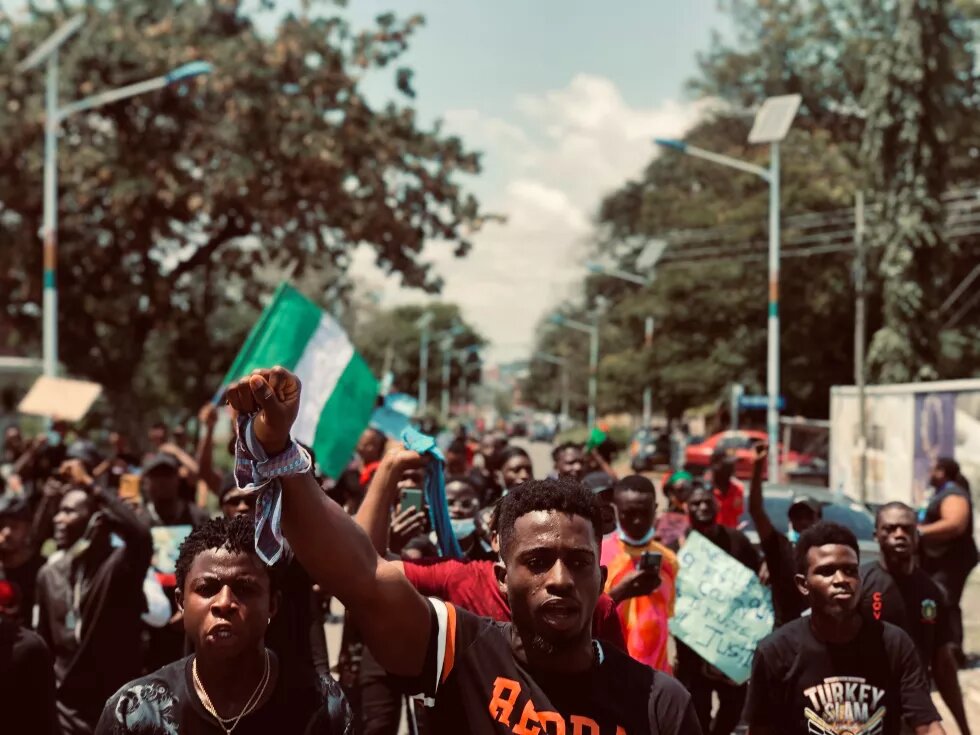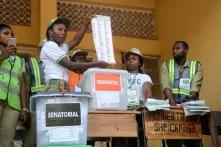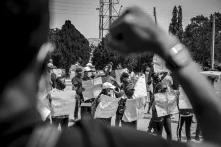
It is taken for granted that Nigeria is on the verge of a defining moment in its history. A significant political shift or a descent into, well, perhaps failed nationhood. If there is a third option, it doesn’t seem so obvious and not many Nigerians are counting on it.
These are the choices Nigerians are faced with ahead of February 2023’s general elections as they seek a replacement for President Muhammadu Buhari at the completion of his eight years in office.
For many young Nigerians, this is the chance to have a major say in the country’s complicated politics and its governance, to push the reset button, if you like. It is a hope that has seen a significant spike in key data. The head of the country’s electoral commission, Mahmood Yakubu, said in January on national TV that younger people, between the ages of 18 and 34, constituted a significant majority of newly registered voters.
This could mean something pivotal. Perhaps a ballot revolution of the young. Or it could also mean nothing. Seventy per cent of the country’s 200 million people are under 30. The irony though is that the country has for the majority of its 62 years of independence been led by a generation of now retired military officers who have been in power or its intoxicating corridors since the first decade of independence in the 1960s. First, they ruled as military dictators. Then some of them, like caterpillars, shed their uniforms, threw on flamboyant agbada robes and returned as elected presidents. By February 2023, President Muhammadu Buhari and his former boss, Olusegun Obasanjo, another military Head of State turned democratically elected president, would have governed the country for 22 years, split equally between them.
That would be 30 years if one adds General Ibrahim Babangida’s eight-year military junta between 1985 and 1993. And then there were those nine loopy years of General Yakubu Gowon (1966-1975), encompassing a three-year civil war at its beginning.
For the first time in its history, Nigeria has enjoyed 24 years of uninterrupted democracy after three prior failed attempts. There has hardly been any difference between the Peoples’ Democratic Party (PDP), which ruled for the first 16 years, and the All Progressives Congress that completed that tally. The personnel involved have consistently switched sides so much so that Nigerians, like the animals in Orwell’s Animal Farm, cannot tell who is who. That is not really the problem. The problem is that there has been consistent profligacy with the commonwealth, and the social and political order has suffered and been broken, some say, beyond repair.
That leads us to the now. There has been for a while now, a groundswell of desire to swat aside the old order, the now gerontocratic cabal of politicians whose generation has been ruling the country essentially since its independence in 1960. The same names, the same men in different costumes like characters in a never-ending surrealist play. Buhari, for instance, was military Head of State in the ’80s when I started school. He was elected president in 2015 when my son started his.
However, for the first time since the return to democracy in 1999, there will be no retired general running for president. But the two major contenders from the two most prominent parties, Atiku Abubakar and Bola Ahmed Tinubu are 75 and 70, officially. In reality, some of them look older.
Atiku has been vice president for eight years and has been on the ballot, one way or the other, in every general election since 1999. Tinubu on the other hand was elected governor of Lagos in that year and has remained a formidable power broker since.
Yet, like an awakening captive audience for that surrealist play, young Nigerians are stirring, and have gravitated towards Peter Obi, the outside candidate who only a few months ago was running for president under the PDP. He defected to the hitherto comatose Labour Party and infused it with a zing.
Amongst the candidates, he has made the most gains, inspiring millions of young Nigerians to pledge their support and hold marches in various capitals across the country. Once he and his support base were laughed at. Now, no one is laughing as they have proven themselves formidable enough to be taken seriously.
While that won’t guarantee success at the polls, it speaks resoundingly of young Nigerian’s frustrations with the old order and demonstrates, once more, an increasing desire to shape outcomes, political or social, in the affairs of the country.
The trigger for this could be pinpointed to 2020, the year of Covid, when young people mobilised on social media and took to the street to protest habitual police brutality.
The #EndSARS protest, targeted specifically a special police unit that made a habit of indiscriminately violating the human rights of young Nigerians. The scale and reach of those protests took many by surprise. It almost, nearly, rose above the ethnic, regional and religious divisions that have kept the youths uninterested in national affairs. They marched in various capitals and called for police reforms. The protests were so powerful and threatened to birth a nationalist movement, forcing the government to make concessions and meet the protesters' demands.
However, without a clear exit strategy, the first sniff of triumph spurred the protesters, their demands spawned others. Organisation dithered under the pressure of chaos introduced by thugs that may have been sponsored, aided and abetted by government agents. Photographic evidence exists of these thugs being conveyed in government vehicles to confront protesters. And then on October 20th, armed soldiers drove to the Lekki Tollgate in Lagos where thousands of protesters were singing the national anthem and waving the Nigerian flag and opened fire.
How many people died that night? The figures vary from one person to 12, to 40, depending on who is telling the story. What is not in contention is that that moment was the definitive break between the old order and young Nigerians. And that division is playing out ahead of these elections.
While the protests then were almost epochal, in the end, they collapsed under the weight of Nigeria’s historical bane—tribalism, regionalism and religion—and yes, blunt military might as well.
It is impossible to extricate this malaise from the 2023 elections, as from the ones that have preceded it. Tinubu told his Yoruba supporters that it is his tribe’s turn to rule, and by extension, it is his turn to rule. Peter Obi’s popularity has as much to do with his Igbo background and the core of his Igbo/Christian support base as much as it does with a desire to bring change, while Atiku Abubakar has tried to remain neutral but has taken massive hits for deleting a tweet condemning the lynching of a Christian student for blasphemy by an enraged Muslim mob in Sokoto in May 2022.
That the passion of young people to take back the country from the men who did the same thing two generations ago, to push the reset button, might be tainted by the same religious and ethnic pallor that doomed that first military intervention in 1966 is a poignant irony about how far Nigeria has come and how in reality very little progress has been made.
The more things change the more they stay the same. Many young Nigerians have seen that, many are tired of it and a good number of them have decided they have had enough. These are not holding out hope to change things at the elections. They have given up and are leaving the country in droves. A mass migration, probably surpassing the one witnessed in the early to mid-'80s when ironically this same Buhari was in power. A good number of them have no intention of returning. The phenomenon has been named ‘japa’ and it is draining the country of some of its finest young brains in the sciences and the arts. The government has continued to pretend it isn’t noticing the exodus.
Universities have been shut for almost a year now over academic staff union strike. The same thing happened in 2020. The government’s response has been the same nonchalance it has deployed in dealing with the deteriorating security situation in a country where one of the few flourishing industries has become kidnap-for-ransom.
In a country of young people, the most significant demographic has suffered the greatest neglect.
For 2023, some young people are effectively going about it as if it is a clash of generations. But the reality is that Peter Obi is incidental, an afterthought of some sort. For some Nigerians, he ticks the right tribal and religious boxes. He is 61 though and his frugality with public funds, while he was governor of Anambra State, has been held as evidence of incorruptibility. But his name has appeared in the Pandora Papers, the leak laying bare the entanglement of global politicians and secretive offshore finance, and in reality, there were no lasting improvements in Anambra when he was governor.
What many young Nigerians are not addressing is that we have been here before—the popular candidate, the mass appeal and goodwill, the anti-establishment and go-it-alone candidate. We have had that before. It is just painful now to admit that Buhari enjoyed all of that in the North from 2003 when he first contested, to 2015, when he eventually won. Like now, his supporters thought their votes would be enough. In the end, Buhari had to get in bed with the politicians he claimed to despise before he won.
If Peter Obi overcomes Tinubu and Atiku, and there is a big if here, he will be a lone wolf in the presidential villa. Rescuing Nigeria from its woes will take a special force of technocrats, not just a frugal commander-in-chief, a one-man army. If he does win, he will have no choice but to work with the many politicians that young Nigerians are eager to see the back of. Therein lies the rub.
And about Nigeria being on the edge, Nigeria has a habit of being there. This time though, it feels as if something is different.
The views expressed are those of the author and do not reflect the views or position of the Heinrich Boell Foundation.


